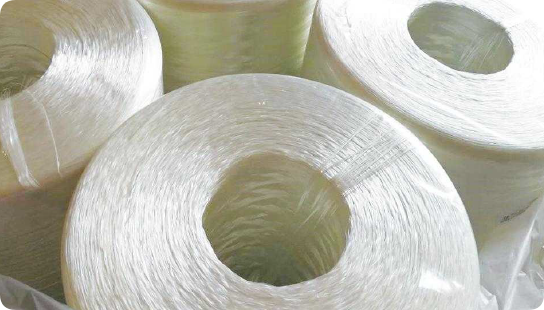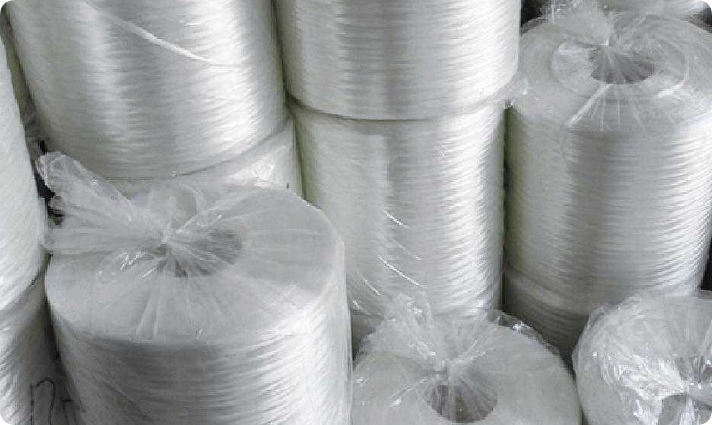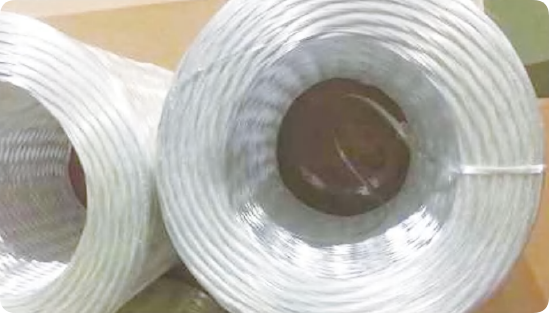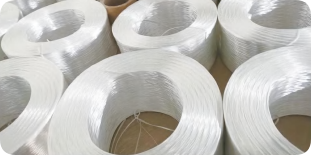SMC Alkali-Free Yarn
| Product Description |
SMC alkali-free yarn is used to produce SMC sheets and is chopped to lengths of 25mm to be dispersed into resin paste. It requires good choppability, low fuzz, and antistatic properties. The yarn should not wrap around the cutter during chopping. For colored SMC, good resin permeability is essential to ensure uniform dye penetration. Alkali-free yarns for SMC are suitable for unsaturated polyester, vinyl ester, and other resin systems. |
|---|---|
| Product Features | 1. High dispersion after chopping, low static electricity 2. High surface quality, easy to color for SMC products 3. High water boiling resistance, suitable for SMC bathroom products 4. Good flowability and strength, suitable for high-performance A-grade surface SMC |
| Applications | Widely used in automotive parts, bathtubs, water tanks, purification tanks, various seats, and various transport equipment. |
| Specifications | Common specifications: 2400TEX, 4800TEX; customizable based on customer needs. |
| Packaging | Pallet packaging |
| Storage | Store in a dry and cool place, away from rain. Recommended storage conditions: temperature 5°C–35°C, humidity 35%–65%. Leave product at room temperature for over 24 hours before use for optimal performance. Recommended to use within 12 months of receipt. If not used, avoid opening packaging or tying it tightly to prevent moisture absorption. |
Alkali-Free Plastic Reinforced Yarn
| Product Description |
Alkali-free plastic reinforced yarn is treated with a special coupling agent and is specifically designed for reinforcing nylon, PBT, and other engineering thermoplastics. |
|---|---|
| Product Features | 1. Excellent bundling; low fuzz 2. Better filament density 3. Good dry flowability, helpful for continuous feeding; ensures uniform glass fiber content in final products |
| Applications | Suitable for reinforcement in PA, PBT, PET, PP, ABS, AS, PC, PPO, PPS, POM, and LCP thermoplastic materials. |
| Specifications | Common specifications: 1200TEX, 2400TEX, 4800TEX; customizable based on customer requirements. |
| Packaging | Pallet packaging |
| Storage | Store the product in a dry and ventilated place, away from rain. Recommended storage temperature: 5°C–35°C, humidity: 35%–65%. Place at room temperature for more than 24 hours before use for better performance. Recommended to use within 12 months after receipt. If not used, avoid opening the packaging or sealing it too tightly to prevent moisture absorption. |
Alkali-Free Glass Fiber Pultrusion Yarn
| Product Description |
When glass fiber is used as a reinforcing material in plastic reinforcement applications, its most notable features include high tensile strength and excellent resistance to tensile damage. Under standard conditions, tensile strength is ≥6.3 g/d, and in humid conditions it is ≥4.5–5.8 g/d, with a density of 2.54. It also has excellent heat resistance up to 300°C without significant loss in strength. With excellent electrical insulation, it is an ideal material for electrical insulation and heat-resistant, flame-retardant applications. It is widely used in electrical insulation, flame-retardant, and corrosion-resistant materials. |
|---|---|
| Product Features | 1. Treated with silane coupling agent 2. Uniform tension, excellent forming properties 3. High abrasion resistance, low fuzz 4. High filament density, good yarn uniformity 5. Excellent compatibility with resins like unsaturated polyester and epoxy; fast and complete resin penetration |
| Applications | Widely used in construction grids, profile materials, telecommunications (fiber optics, reinforced optical cable cores), electronics (insulation rods, composite insulation rods), and other electrical insulation materials. |
Alkali-Free Glass Fiber Woven Yarn
| Product Description |
Alkali-free glass fiber yarn is a type of alkali-free silicate glass yarn. It is currently the most widely used type of glass fiber textile yarn. It offers excellent electrical insulation and mechanical properties. |
|---|---|
| Product Features | 1. Excellent wear resistance 2. Good forming performance 3. The yarn is already heat-set during weaving 4. Uniform tension and elongation meet standard requirements 5. Good unwinding performance 6. Excellent resin penetration |
| Applications | Mainly used in the production of glass fiber textile products, such as square woven fabrics, composite yarns, edge yarns, and multiaxial fabrics. |



